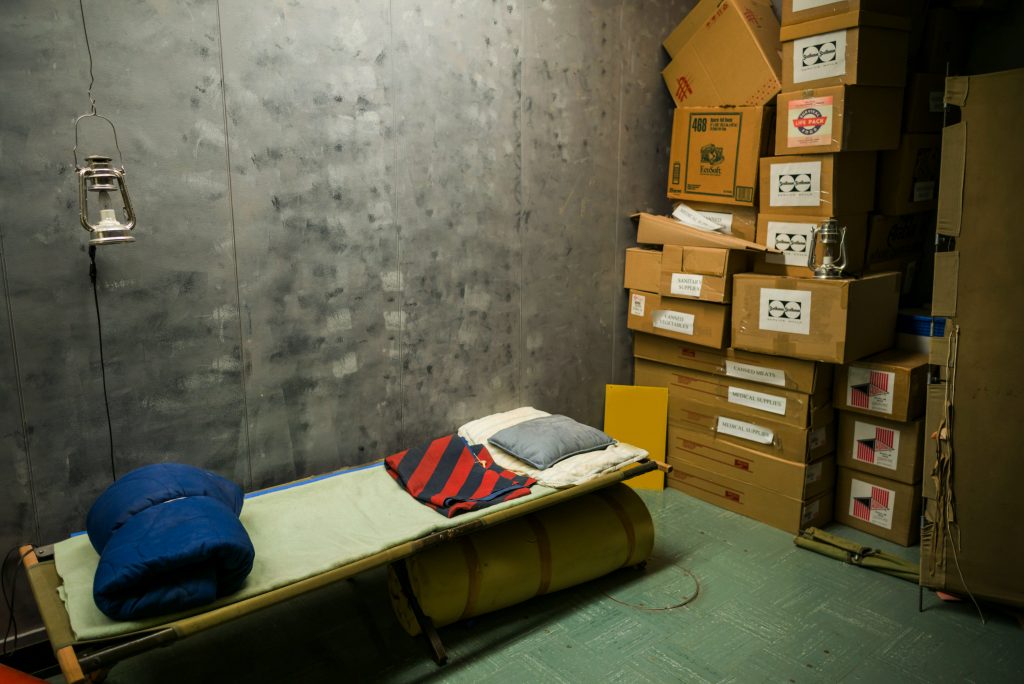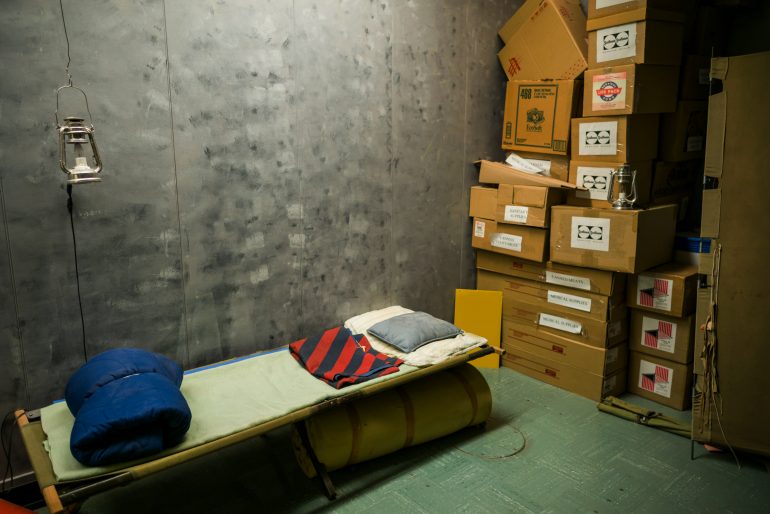Eric Scot Tryon

Everything changed the summer Rodney Jenkins came to live in our basement. Mom set up a fold-out aluminum cot among the labyrinth of cardboard boxes. The boxes that held thousands of whatevers my dad swore to Saint Jude would make us rich. And with an embroidered pillow off the couch and my old Star Wars sleeping bag, the kid from Arizona with the shaved head and wisp of a mustache was all set.
Rodney Jenkins towered above me with arms covered in scars and homemade tattoos, and he talked in a low, mumbly voice. Even though he was probably only five years older, there were lifetimes between us.
He spoke to me just once that whole summer. I had snuck out of bed one night when it was way past too hot to sleep and tip-toed into the kitchen to get a soda.
“What do you want?”
I hadn’t seen him at first, but standing against the counter was Rodney Jenkins eating an oversized bowl of cereal in the dark of the kitchen.
I didn’t speak, but as my eyes adjusted, I could see that he was naked.
“Get back upstairs if you know what’s good for you,” he said.
I turned and flew up the stairs like a spooked cat.
Lying in bed that night, head under the covers, I couldn’t stop thinking about his naked body. In the whisper of light that came up from the basement, he looked lumpy and bony and sticky. His penis was enormous, hanging lazily down by his knees. At least that’s how I remembered it. Throughout my adolescence, that image of Rodney Jenkins and the elephant trunk that swung from between his legs would haunt me.
I spent countless nights locked in my room. Sometimes just standing in front of the mirror, naked, staring at my soft, dull body, wondering how in the world Rodney Jenkins and I were the same species.
During the day, he went somewhere. No one knew where exactly. He returned around six, always red-faced and a little sweaty, and his steps fell heavy as he descended the basement stairs. A couple times Dad caught him down there with a girl. Never the same one, but always some pale skeleton who slunk out of the house, eyes hidden behind a veil of greasy hair. And when Dad found out they were smoking, he completely flipped.
But my mom, perpetually sad and always in the tattered purple robe she wore like a second skin, just threw her hands in the air. “What are we going to do?” she’d say. “We promised Nancy.” As if they were just helpless victims to this unbreakable promise. “It’s just for the summer.”
June passed, then so did July, and the kids at the park always asked if Rodney Jenkins had done anything exciting lately. As much as I hated having him down there, I liked how people always asked about him. Even the high schoolers would nod in my direction. “That’s the kid,” they’d say. “Rodney Jenkins lives in his basement.”
It was early August when Frankie came over for a sleepover. And after two movies and three bowls of popcorn he asked could we please, please, please go spy on Rodney Jenkins.
“Are you kidding,” I said. “He’s crazy.”
“Please!” Frankie pleaded. “C’mon, for a second, I just want to see him.”
And so it was nearly 3AM when we army crawled to the top of the staircase. I knew the basement door would be closed, and then we could go back to the safety of my room. But it wasn’t. There was a sword of faint light coming from the crack in the basement door shooting across the kitchen tile.
“Let’s go look!” Frankie whispered.
“No way. I’m staying right here.”
“C’mon!”
We went back and forth a dozen times until finally he did the unthinkable. Frankie offered me his 1965 Johnny Roseboro, mint condition. It was the only card from the ’65 Dodgers that I was missing, and Frankie used to tell me he would take that card to the grave. But Rodney Jenkins made people do crazy things.
As we tip-toed across the cold kitchen floor, we heard a shuffling coming from the basement. Deathly afraid to make a sound, Frankie and I conversed in facial expressions. Let’s go back, I said with my eyes. We had a deal, he told me with tightened lips and a wrinkled forehead. He was right.
The basement door was open just an inch. And when we got there, Frankie put a finger in the gap, looked at me, and pulled it open just enough. I could feel my heart beating in my ears. But when we stuck our faces in the opening we couldn’t see anything. There was barely any light and because of all the damn boxes. My mom called it my dad’s “castle of failure.”
But then we heard laughter. Not ha-ha laughter, but rather the kind that comes with doing something you’re not supposed to. I hadn’t laughed that way yet, not really. And even though we didn’t say anything, I knew Frankie and I were thinking the same thing. If he had a girl down there, maybe we would see something. We saw a blurry boob once on a late-night movie, but this was different. This was real. I was afraid for my life, but also now, I was suddenly so excited. Frankie looked at me and smiled.
And then our eyes adjusted. It would be the first time of many in my life. Eyes adjusting. Always, eventually, showing us what’s really going on. Frankie saw it first and elbowed me in the ribs. The laughter and whispers increased, and the voices sounded so happy I didn’t even recognize them. But there it was: hanging off the corner of a cardboard box, hanging loose like a skin that had been shed – a sad, tattered purple robe. And then my eyes adjusted once more.
Eric Scot Tryon’s work has previously appeared in more than a dozen literary journals and anthologies, including Glimmer Train, Willow Springs, Berkeley Fiction Review, Wisconsin Review, Rio Grande Review, and others. He lives in Pleasant Hill, California with his wife, daughter, new kitten, and two poison dart frogs. You can find more info at www.ericscottryon.com and follow him on Twitter at @EricScotTryon.

